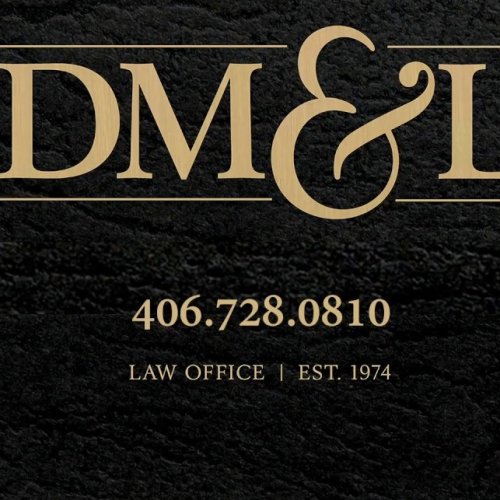Best Criminal Litigation Lawyers in Montana
Share your needs with us, get contacted by law firms.
Free. Takes 2 min.
Or refine your search by selecting a city:
List of the best lawyers in Montana, United States
About Criminal Litigation Law in Montana, United States
Criminal litigation in Montana refers to the legal processes involved in prosecuting or defending individuals or entities accused of committing crimes as defined by state law. The process can start with an investigation, followed by an arrest, formal charges, arraignment, trials, and potential appeals. Criminal cases in Montana can range from misdemeanors, such as minor theft or disorderly conduct, to serious felony charges like assault, burglary, or homicide. The Montana court system ensures that anyone accused of a crime is entitled to due process under both the United States Constitution and the Montana Constitution. Understanding each phase of the litigation process is key for anyone facing or involved in criminal proceedings.
Why You May Need a Lawyer
Criminal litigation is complex and can have life-altering consequences. Some common situations where you may need a criminal defense lawyer in Montana include:
- Being arrested or charged with a crime
- Receiving a summons or subpoena related to a criminal investigation
- Facing police interrogation about a suspected crime
- Believing you are under surveillance or investigation
- Needing to negotiate plea agreements
- Planning to appeal a criminal conviction
- Having prior convictions impacting current charges
- Being accused of violating probation or parole
- Being charged as a juvenile or as an adult for crimes committed as a minor
A lawyer protects your rights, examines the facts, negotiates with prosecutors, and builds a strong defense, all of which greatly impact the outcome of a criminal case.
Local Laws Overview
Montana criminal law is contained primarily in Title 45 of the Montana Code Annotated (MCA). Here are some key points to note:
- Classification of Crimes: Crimes are classified as either misdemeanors or felonies. Felonies carry more severe penalties, including longer imprisonment and higher fines.
- Arrest and Bail: Montana law provides procedures for arrests, the setting of bail, and requirements for first appearances before a judge, including advisement of rights and appointment of counsel for those unable to afford one.
- Rights of the Accused: The accused have rights to remain silent, to counsel, to a fair and speedy trial by jury, and to confront witnesses.
- Plea Bargaining: Many criminal cases in Montana are resolved by plea agreements rather than trial, but these must be approved by the court.
- Diversion and Deferred Prosecution: For some offenses, especially non violent or first-time offenses, Montana courts may offer diversion programs or deferred sentences.
- Sentencing Guidelines: Sentences for various offenses are outlined in the MCA, but judges have some discretion based on mitigating and aggravating factors.
- Expungement: Some criminal records in Montana may be eligible for expungement or sealing, giving individuals a second chance without the burden of a permanent criminal record.
Frequently Asked Questions
What should I do if I am arrested in Montana?
Remain calm and ask to speak with a lawyer. Do not answer questions without legal counsel. You have the right to remain silent and the right to an attorney.
Can the police search me or my property without a warrant?
Generally, searches require a warrant, but there are exceptions such as consent, search incident to arrest, or when evidence is in plain view. Any questionable search or seizure should be reviewed by a lawyer.
What is the difference between a misdemeanor and a felony in Montana?
Misdemeanors are less serious crimes with lighter penalties, such as jail time of up to one year and smaller fines. Felonies are more serious and can result in over a year of imprisonment and higher fines.
How soon do I have to appear in court after being charged?
Typically, you must appear for an initial appearance or arraignment soon after arrest or summons. Missing a court date can lead to additional charges or a bench warrant.
What happens at a bail hearing in Montana?
A judge determines if you can be released while awaiting trial and under what conditions. Factors considered include the seriousness of the offense, ties to the community, and prior record.
Can I represent myself in a criminal case?
While you have the right to self-representation, criminal law is complex. Legal mistakes can have severe consequences, so it is strongly advised to seek a qualified defense attorney.
What is a plea bargain?
A plea bargain is an agreement between the defendant and prosecutor where the defendant pleads guilty to a lesser charge or receives a reduced sentence in exchange for waiving the right to a trial.
What is an arraignment?
An arraignment is the first court appearance after charges are filed, where you hear the charges against you, enter a plea, and may be assigned counsel if needed.
Can I appeal a conviction in Montana?
Yes. If convicted, you may file an appeal to a higher court. Appeals must be based on legal errors or violations of rights during the trial process.
How do criminal records impact my future?
A criminal record can affect employment, housing, voting rights, and firearms ownership. Some convictions may be eligible for expungement or sealing under certain conditions.
Additional Resources
If you require more information or assistance with criminal litigation in Montana, consider these resources:
- Montana Judicial Branch: Offers resources on court procedures, case records, and self help services.
- Montana Office of the Public Defender: Provides legal representation for those who qualify based on financial need.
- State Bar of Montana: Can help you find licensed criminal defense attorneys in your area.
- Montana Department of Corrections: Provides information on sentencing, probation, parole, and rehabilitation programs.
- Local Legal Aid Organizations: Some non profit organizations offer free or sliding-scale legal assistance for those facing criminal charges.
Next Steps
If you are facing criminal charges or believe you may be under investigation:
- Contact a criminal defense attorney as soon as possible to discuss your situation and protect your rights.
- Do not make any statements to law enforcement or investigators without legal representation.
- Gather and organize any documentation related to your case, including police reports, charging documents, and correspondence from the court.
- Ask your attorney about important deadlines and hearings you must attend, and discuss your options for bail or release conditions.
- If you cannot afford an attorney, apply for representation through the Montana Office of the Public Defender.
Understanding your rights and obtaining skilled legal representation are essential to navigating the criminal litigation process in Montana. Take prompt action to ensure your interests are protected throughout every stage of your case.
Lawzana helps you find the best lawyers and law firms in Montana through a curated and pre-screened list of qualified legal professionals. Our platform offers rankings and detailed profiles of attorneys and law firms, allowing you to compare based on practice areas, including Criminal Litigation, experience, and client feedback.
Each profile includes a description of the firm's areas of practice, client reviews, team members and partners, year of establishment, spoken languages, office locations, contact information, social media presence, and any published articles or resources. Most firms on our platform speak English and are experienced in both local and international legal matters.
Get a quote from top-rated law firms in Montana, United States — quickly, securely, and without unnecessary hassle.
Disclaimer:
The information provided on this page is for general informational purposes only and does not constitute legal advice. While we strive to ensure the accuracy and relevance of the content, legal information may change over time, and interpretations of the law can vary. You should always consult with a qualified legal professional for advice specific to your situation.
We disclaim all liability for actions taken or not taken based on the content of this page. If you believe any information is incorrect or outdated, please contact us, and we will review and update it where appropriate.
Browse criminal litigation law firms by city in Montana
Refine your search by selecting a city.










